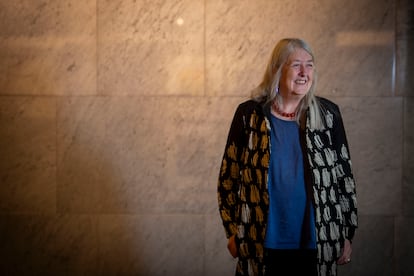Mary Beard: ‘The Roman Empire emboldens self-absorbed macho men’
The expert on Ancient Rome explores the lives of emperors in a new book, covering the scandalous Heliogabalus and defining moments that shaped our political culture


Mary Beard has the rare gift of knowing how to effectively share her extensive knowledge. The English historian, emeritus professor at the University of Cambridge, recipient of the 2016 Princess of Asturias Award, and author of numerous books on Ancient Rome, returns with yet another exceptional work: Emperor of Rome: Ruling the Ancient Roman World. It’s a captivating read that seamlessly blends entertainment with profound insights into the world of Roman emperors. This timely release coincides with the present-day debates about the enduring male fascination with the Roman Empire.
Question. Is what they say true? Are men obsessed with the Roman Empire?
Answer. I‘m surprised about it, but I tend to believe it’s true. In some ways, the Roman Empire provides a safe space for male fantasies, a distant era where one can indulge in macho fantasies — wearing togas, building roads and other masculine activities. I’ve never met any men who think about the Roman Empire all day long, but I bet they’re only focusing on a small part of it. By reading my book, you’ll discover that Rome offers much more — it’s more interesting than you’d think.
Q. The British-French writer Philippe Sands recently told me that putting “Nazism” on the cover of a book guarantees good sales, but putting “British Empire” doesn’t. Why do the Roman Empire and Nazism sell books and not the British Empire?
A. It can be challenging to confront historical events that require intellectual courage and introspection. The Roman Empire seems very distant, enabling us to appreciate it without feeling guilty. Yet, it is important to critically assess its impact. Similarly, Nazism can appeal to a self-congratulatory belief that we alone triumphed over Hitler. However, the reality is more nuanced. These binding myths often find their way into holiday films, catering to our sense of virtue. But the British Empire can be problematic because it forces us to face uncomfortable truths. The complexities of World War II have been homogenized in popular culture. The same happened with the British Empire. It was once portrayed as a civilizing mission, but now its various facets are well recognized. Reading the history of the British Empire can make us face challenging issues, but it can still be enjoyable.
Q. Back to the Romans — what new do we need to know about them? Is there another mystery for Mary Beard to explore?
A. For me, the greatest mystery continues to be the lives of the commoners. There are big and intriguing questions in ancient history that many people would love to unravel… like how did Augustus develop a one-man system? However, my interest lies in real-life situations. If I had the opportunity to spend a day in the Roman Empire (just one, because more would be overwhelming), I would go to the public baths. I want to see how they worked, who went there and what they talked about. I’d like to delve into daily life rather than undertake grand historical inquiries.
Q. You have studied all the emperors. Do you have any favorites?
A. They were all horrible.
Q. What about Marcus Aurelius?
A. Choosing a favorite is difficult because we don’t really know what they were like. Their reputation was established posthumously after their deaths or murders. Anecdotes, whether silly or fascinating, tend to be the same. Virtues and vices followed a clear pattern. We often perceive power, but rarely glimpse the true essence of a person. Marcus Aurelius, for instance, revealed some things about himself through letters to his tutors and discussions with doctors about his health. We learn a little from that, but not about his philosophy of power or whether he was a kind man.
Q. Murder was a common solution to problems in Ancient Rome. And it’s happening right now in Ukraine, Gaza and Israel. Haven’t we evolved?
A. Yes, we have evolved because it’s a source of concern now. Back then, murder was a fact of life. When you live in a place without police, without crisis management… murder is the way to solve problems. We now know it’s not a good solution. We still do it — we haven’t solved the problem of war and crimes — but we know it’s wrong. Yes, we’ve advanced and we’re better. Neither of us would like to go back to the way things were.
Q. Not a single empress among the dozens of male emperors. Is discrimination an eternal fact of life?
A. It’s a problem we’re still dealing with. The Roman world, like the Greek and earlier societies, had strict social divisions between men and women. From the earliest times, men fought outside and women raised children indoors. The United Kingdom has only had three female prime ministers (although I’m not particularly proud of any of them), so we still adhere to this division. Some argue it’s natural. Fewer people express this view now, but it still persists. Rome is so appealing to conservatives because women were subordinate in that society. Any woman who tried to challenge that faced severe criticism.
Q. Let’s talk about Heliogabalus. In addition to serving his guests a meal of camel heels and flamingo brains, he wore makeup and supposedly wanted female genitals. Was he a trans emperor?
A. We don’t know if those stories are true, but they do tell us that gender fluidity ideas are nothing new. Every society has been intrigued by blurred lines between males and females. In Ancient Rome, gender roles were the basis of their political and social order, yet they also questioned them. Mythology has often explored this in stories about men transforming into women. Iconic statues of hermaphrodites depicting a woman with breasts and a penis can be found in various parts of the world. The Roman world can shed some light on our present-day discussions about non-binary sexuality and gender fluidity.
Q. There are also testimonies of homosexuality, like the letters Marcus Aurelius wrote to his teacher, Fronto. How common was it?
A. It‘s difficult to know who’s sleeping with who these days, let alone 2,000 years ago (laughs). However, sexual norms were clearly different back then. When I was a student, we used to think that the Roman Empire was a place of absolute freedom where anything goes, especially among the upper class. Over the past 50 years, we’ve come to understand that they did have sexual norms — they were just different from ours. Take, for instance, the relationship between Hadrian and Antinous, his Greek slave and boyfriend. It seems that an older man in a dominant relationship with a younger man wasn’t considered a problem. But Hadrian’s intense grief after Antinous’ death was severely criticized. He commemorated Antinous with numerous statues, deified him, and even named cities after him. The criticism stemmed from Hadrian’s reaction to Antinous’ death, not the relationship itself. In that ancient world, it was typically women who grieved and cried. People saw Hadrian behaving like a woman.
Q. What is Rome’s influence on our social mores and principles today?
A. The influence is everywhere in Spain and the United Kingdom. We coexist with their creations, such as our transportation system, which is based on theirs. We are deeply embedded in Roman infrastructure. While there isn’t much legacy left in terms of social organization, there is still common ground when it comes to political challenges. Like the Romans, we also wonder whether we can trust our leaders. Are they genuine or putting on an act? This was a prevalent issue in Ancient Rome. Tacitus suggests that Emperor Nero’s speech after Emperor Claudius died was not original, that he was perhaps the first leader to depend on borrowed words. Nowadays, it’s common for politicians to do this, and it’s sometimes unsettling to know their words have been crafted by expert speechwriters. We desire to truly know our leaders because we only see them through their public performances. There are numerous anecdotes about Nero’s enthusiasm for acting in stage plays. His subjects said that it wasn’t appropriate behavior for an emperor, and some went as far as calling him crazy. We also have notions of what constitutes politically objectionable behavior and doubts about who is really running the country. We should think about our own acquiescence to the wars and bloodshed, as we all share some responsibility.
Sign up for our weekly newsletter to get more English-language news coverage from EL PAÍS USA Edition
Tu suscripción se está usando en otro dispositivo
¿Quieres añadir otro usuario a tu suscripción?
Si continúas leyendo en este dispositivo, no se podrá leer en el otro.
FlechaTu suscripción se está usando en otro dispositivo y solo puedes acceder a EL PAÍS desde un dispositivo a la vez.
Si quieres compartir tu cuenta, cambia tu suscripción a la modalidad Premium, así podrás añadir otro usuario. Cada uno accederá con su propia cuenta de email, lo que os permitirá personalizar vuestra experiencia en EL PAÍS.
¿Tienes una suscripción de empresa? Accede aquí para contratar más cuentas.
En el caso de no saber quién está usando tu cuenta, te recomendamos cambiar tu contraseña aquí.
Si decides continuar compartiendo tu cuenta, este mensaje se mostrará en tu dispositivo y en el de la otra persona que está usando tu cuenta de forma indefinida, afectando a tu experiencia de lectura. Puedes consultar aquí los términos y condiciones de la suscripción digital.








































